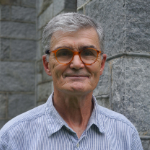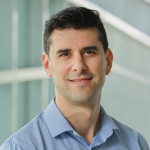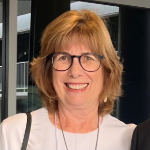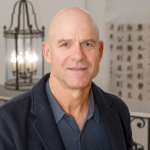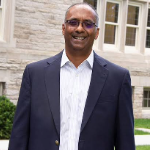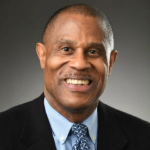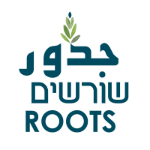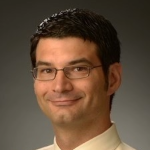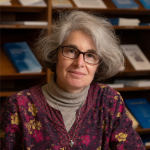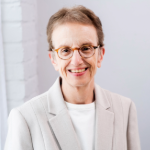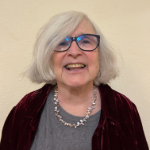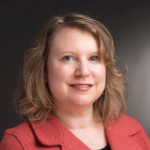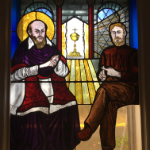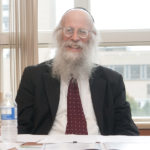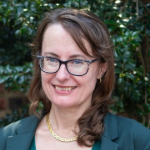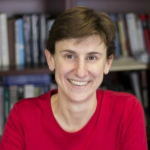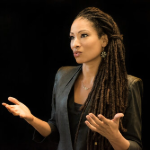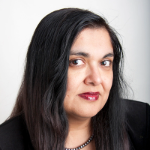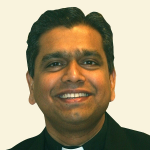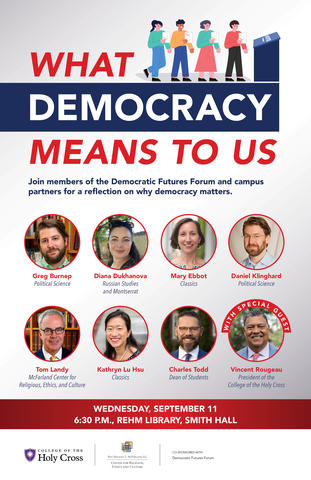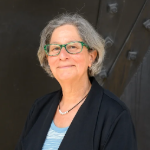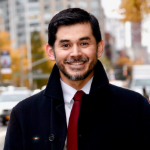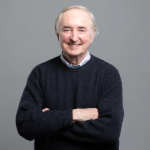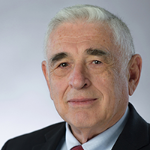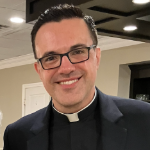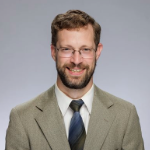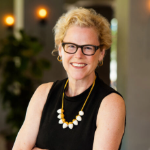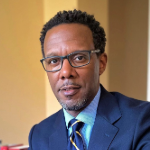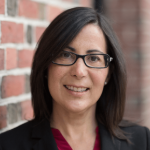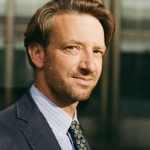Spring 2025
Thoreau's Religious Quest
Thursday, January 30, 2025
4:30 p.m., Rehm Library, Smith Hall
Add to Google Calendar
Henry David Thoreau was a harsh critic of the "respectable" Christianity of his day, but he was also a mystic with a deep reverence for the sacredness of life. Richard Higgins '74, the author of Thoreau's God, explores Thoreau's innate religiosity and his search for communion with a divine mystery that was at once immanent in the natural world and yet transcendent.
Watch the lecture online >>
The Israeli-Palestinian Conflict: Past and Present
Thursday, February 6, 2025
4:30 p.m., Rehm Library, Smith Hall
Add to Google Calendar
Come to a deeper understanding of the conflict between Israelis and Palestinians through an appreciation of its long history, its origins in the remaking of the world order after WWI, the national and religious beliefs of the different parties, and how a century of war and attempts at peacemaking impact the current situation.
Alexander Kaye is the Director of the Schusterman Center for Israel Studies at Brandeis University, where he holds the Karl, Harry, and Helen Stoll Chair in Israel Studies and is an Associate Professor in the Department of Near Eastern and Judaic Studies.
Part of the Kraft-Hiatt Program for Jewish-Christian Understanding.
Luncheon Presentation / Educated by Anxiety: Toward Building a Culture of Care
Monday, February 10, 2025
12:00 p.m., Hogan Suite A
RSVP required: Register here by Wednesday, January 29
Add to Google Calendar
How can we guide our students through their "education by anxiety" toward leading lives of care—both providing it and, when needed, receiving it? Join us for a discussion about Cura Psychologia, an interdisciplinary research project, and a future edited volume, with collaborators Professors Mark Freeman, Peter Fritz, and Frances Maughan-Brown.
Immigrant Churches in Aotearoa New Zealand: Sites of Challenge and Hope
Monday, February 10, 2025
4:30 p.m., Rehm Library, Smith Hall
Add to Google Calendar
Aotearoa New Zealand has seen several distinct waves of Catholics arrive on its shores beginning with Bishop Pompallier's arrival from France in 1838. Drawing on her ethnographic research, Robyn Andrews, Social Anthropologist and Research Fellow at Massey University, discusses the tensions, challenges, and hopes around incorporating the most recently arrived migrant groups, Catholics from the Philippines and South India.
The Daode jing (The Scripture of the Way and its Virtue): Its Curious Route to Becoming a Classic of World Religions
Thursday, February 13, 2025
4:30 p.m., Rehm Library, Smith Hall
Add to Google Calendar
The Daode jing, the main sacred book of Daoism, has attracted the attention of many East Asian scholars from the 3rd century BCE onward. James Robson, Professor of East Asian Languages and Civilizations at Harvard University and Director of the Harvard-Yenching Institute, discusses the diverse afterlives of the Daode jing, including the many radically different interpretations of its enigmatic content.
Co-sponsored with the Department of Religious Studies.
Catholicism in India: Blending in and Staying Apart, 1500-Present
Tuesday, February 18, 2025
4:30 p.m., Rehm Library, Smith Hall
Add to Google Calendar
What happens when the world’s oldest multicultural organization—the Catholic Church—interacts with one of the most religiously and linguistically diverse regions of the world? It results in a tug-of-war between blending in and staying apart. Using images and anecdotes from a five-hundred-year history, Chandra Mallampalli, Historian of Modern South Asia at Harvard University’s Mittal Institute, describes the Church’s dual tendency to adapt to its Indian surroundings while retaining a sense of distinctiveness and mission.
A Deitchman Family Lecture on Religion and Modernity.
Courageous Hope in Precarious Times
Thursday, February 20, 2025
4:30 p.m., Rehm Library, Smith Hall
Add to Google Calendar
Bryan Massingale is the James and Nancy Buckman Professor of Theological and Social Ethics at Fordham University and a Senior Fellow in its Center for Ethics Education. An award-winning scholar, teacher, Catholic priest, and activist, he is a leader in Catholic theology.
A Deitchman Family Lecture on Religion and Modernity.
Two Truths in One Heart; Two Peoples in One Land
Tuesday, February 25, 2025
7:00 p.m., Rehm Library, Smith Hall
Add to Google Calendar
Roots/Shorashim/Judur, a nonprofit organization and unique collaboration of local Palestinians and Israelis, aims to nurture understanding, non-violence, and personal transformation while building a grassroots model for reconciliation. Rabbi Hanan Schlesinger and Khaled Abu Awwad will share their personal, interconnected stories and present the groundbreaking and challenging grassroots work of their initiative.
Part of the Kraft-Hiatt Program for Jewish-Christian Understanding.
Following Christ in the Anthropocene: Spiritual Poverty, Solidarity, and Protest
Wednesday, March 12, 2025
4:30 p.m., Rehm Library, Smith Hall
Add to Google Calendar
Daniel Castillo, Associate Professor of Theology at Loyola University Maryland, will examine several dimensions of the eco-social emergency that characterizes our present-day global context. Then, drawing insight from liberation theology and Scripture, the lecture will consider how persons and communities of faith might begin to envision the task of discipleship.
A Deitchman Family Lecture on Religion and Modernity.
A Conversation with Sr. Nathalie Becquart, xmcj
Thursday, March 13, 2025
4:30 p.m., Rehm Library, Smith Hall
Add to Google Calendar
Join us for a presentation by Sr. Nathalie Becquart, the undersecretary of the General Secretariat of the Synod at the Vatican since 2021 and the first woman with the right to vote during a synod of bishops. As the first woman in her position and a significant part of this group of advisors to Pope Francis, she will discuss the fruits and recommendations of the Synod on synodality and the future of the Catholic Church with our campus community.
Why Science and Religion Need Each Other: Teilhard de Chardin’s Deep Catholicity
Monday, March 17, 2025
4:30 p.m., Rehm Library, Smith Hall
Add to Google Calendar
Science and religion remain at odds today, despite the insistence of Saint John Paul II and Pope Francis to reconcile these areas toward an integrated worldview. Ilia Delio, Franciscan sister and Josephine C. Connelly Endowed Chair in Theology at Villanova University, explores the ideas of Teilhard de Chardin, a Jesuit priest and scientist who developed a cosmic vision of Catholicity, and reflects on whether or not his vision can provide hope in light of the technological challenges of the twenty-first century.
A Deitchman Family Lecture on Religion and Modernity.
How the Irish Helped the Jews Become American
Monday, March 24, 2025
4:30 p.m., Rehm Library, Smith Hall
Add to Google Calendar
From the end of the nineteenth century into the early twentieth, Irish Americans opened doors for Jewish immigrants and other newcomers to the United States. Hasia Diner, Professor Emerita at New York University and Director of the Goldstein-Goren Center for American Jewish History, considers how and where this allyship played itself out and what each group, the Jews and the Irish, had to gain from it.
Part of the Kraft-Hiatt Program for Jewish-Christian Understanding.
Historiography and the Archives: Deaf History as Archival Practice
Friday, March 28, 2025
4:30 p.m., Seelos Theatre, Kimball Hall
Add to Google Calendar
R.A.R. Edwards '90, Professor of History at Rochester Institute of Technology, discusses historiography using the Deaf Catholic Archives as a model to demonstrate the opportunities and advantages, as well as the challenges and obstacles, that researchers encounter when using archival collections.
Co-sponsored with the Archives & Distinctive Collections department.
Conference / Signs of Hope: The Claggett Statement and Deaf Theology Today
Friday, March 28, 2025 and Saturday, March 29, 2025
Seelos Theatre, Kimball Hall
Register Here by March 24th. Holy Cross students are not required to register.
Add to Google Calendar
Penned in 1984 by an ecumenical group of ten deaf and hearing women and men from North America, the Claggett statement was an early expression of Deaf Liberation theology produced at a time of cultural awakening and creativity among Deaf people. This symposium spotlights this important statement on its 40th anniversary, by bringing together scholars and practitioners from the United States and beyond to examine the past, present, and future of the Claggett Statement for Deaf Christians across the world.
This symposium is co-organized by Audrey Seah (College of the Holy Cross) and Kirk VanGilder (Gallaudet University) with the support of Deaf Studies and Sign Languages, Department of World Languages, Literatures, and Cultures, and the Deaf Catholic Archives, Archives and Distinctive Collections at College of the Holy Cross. Attendance is free and open to the public. Registration opens on January 15, 2025.
View the full schedule here >>
A Passion for Celebration: The Inspired Legacy of Elie Wiesel
Monday, March 31, 2025
4:30 p.m., Rehm Library, Smith Hall
Add to Google Calendar
Known for his eloquence as a survivor of the Holocaust, his accomplishments as a literary master, his advocacy of Jewish causes and study, and his unstinting activism as a Nobel Peace Prize laureate, Elie Wiesel also made "celebration" a key term in his personal lexicon of life and work. Alan Rosen, Kraft-Hiatt Scholar in Residence, will aim to show how Wiesel’s passion for celebration, cultivated over decades, served as a driving force behind his vocation and message.
Part of the Kraft-Hiatt Program for Jewish-Christian Understanding.
Thomas More Lecture: War, Homecoming, Heroism, Truth
Tuesday, April 1, 2025
4:30 p.m., Rehm Library, Smith Hall
Add to Google Calendar
Translation Workshop:
Tuesday, April 1, 2025
11:00 a.m., Rehm Library, Smith Hall
Emily Wilson, Department Chair and Professor of Classical Studies at the University of Pennsylvania, discusses what we might learn from the Homeric poems about ethics and empathy, moral and poetic challenges of studying, engaging with, and translating the distant past.
A Thomas More Lecture on the Humanities.
The Military-Industrial Complex, Liberal Capitalism, and the American Way of War
Thursday, April 3rd, 2025
4:30 p.m., Rehm Library, Smith Hall
Add to Google Calendar
Historically, the United States has preferred to fight its wars by substituting technology and money for manpower. Kate Epstein, Associate Professor of History at Rutgers-Camden, will explore the implications of the US “way of war” for the nation’s commitment to liberal capitalism—that is, to norms of representative government, due process, and democratic accountability, on the one hand, and to free markets and private property rights, on the other.
Co-sponsored with Peace and Conflict Studies.
Race to the Future? Resisting & Reimagining the New Jim Code
Tuesday, April 8th, 2025
4:30 p.m., Rehm Library, Smith Hall
Add to Google Calendar
Ruha Benjamin, Professor of African American Studies at Princeton University, presents the concept of the “New Jim Code” to explore a range of discriminatory designs that encode inequity into technology. She will also consider how race itself is a tool designed to stratify and sanctify social injustice and discuss how technology can be used toward liberatory ends. In doing so, Ruha challenges us to question not only the technologies we are sold but also the ones we manufacture ourselves.
Co-sponsored with Critical Race and Ethnic Studies.
The Fall of the Second American Republic
Thursday, April 10, 2025
4:30 p.m., Rehm Library, Smith Hall
Add to Google Calendar
In the late nineteenth century, a formal overseas American empire rose while the long unwinding of the "Second American Republic" began. Manisha Sinha, James L. and Shirley A. Draper Chair in American History at the University of Connecticut, argues that the fall of Reconstruction paved the way for the West’s conquest and a formal and informal American empire in the Caribbean and the Pacific.
Co-sponsored with the Department of History.
Fall 2024
Jesus Christ and Other Religions: Problems and Perspectives
Monday, September 9, 2024
4:30 p.m., Rehm Library, Smith Hall
Please join us in welcoming Fr. Bryan Lobo, S.J., a Jesuit from Mumbai, India, to campus, where he will serve for the 2024-2025 academic year as a McFarland Center International Visiting Jesuit Fellow. Following two terms as Dean of the Faculty of Missiology at the Gregorian University Rome, Fr. Lobo will teach a course on the theology of religions and research theological aspects of Christian proclamation and mission that consider the unique insights of Christian theology in a religious and culturally pluralistic world.
Watch the lecture >>
Democratic Futures Forum / What Democracy Means to Us
Wednesday, September 11, 2024
6:30 p.m., Rehm Library, Smith Hall
Join members of the Democratic Futures Forum and campus partners for a reflection on why democracy matters. The participants include Greg Burnep, Political Science; Diana Dukhanova, Russian Studies and Montserrat; Mary Ebbot, Classics; Daniel Klinghard, Political Science and Dean of Education and Academic Experience; Thomas Landy, McFarland Center for Religious, Ethics, and Culture; Kathryn Lu Hsu, Classics; and Charles Todd, Dean of Students.
With special guest: Vincent Rougeau, President of the College of the Holy Cross.
Solvable: How We Healed the Earth, and How We Can Do It Again
Monday, September 16, 2024
4:30 p.m., Rehm Library, Smith Hall
Dr. Susan Solomon, Lee and Geraldine Martin Professor of Environmental Studies and Chemistry at MIT, argues that we’ve solved planet-threatening problems before, and we can do it again. She’ll examine the inside stories of past environmental victories to extract the essential elements of what has made change possible and what’s needed now to do it again.
Dr. Susan Solomon is internationally recognized as a leader in atmospheric science, particularly for her insights in explaining the cause of the Antarctic ozone “hole.” Her lecture will take place on the United Nations’ International Day for the Preservation of the Ozone Layer.
The Church as Refuge and Asylum for Migrants?
Wednesday, September 18, 2024
4:30 p.m., Rehm Library, Smith Hall
When human life is persecuted and endangered, communities of refuge arise to protect life, even if it is against domestic law to do so. Dr. Leo Guardado, Assistant Professor of Theology at Fordham University, will examine the tradition of the church as a site of refuge and protection, focusing on the 1980s sanctuary movement in the United States.
Watch the lecture >>
Continuity within Chaos: Caring for Individuals Living Chronically in Shelters and on the Streets
Monday, September 23, 2024
7:00 p.m., Rehm Library, Smith Hall
Dr. Jim O’Connell, President and Founder of Boston Health Care for the Homeless Program (and the 2017 Holy Cross Commencement speaker), will share how he transitioned from the role of Chief Internal Medicine resident at MGH to the country’s first street doctor for those experiencing homelessness. Recounting his forty years of serving Boston’s most vulnerable population, Dr. O’Connell will illuminate the history of homelessness and the undue burden of co-occurring disorders among chronically homeless persons. Most importantly, Dr. O’Connell will reflect on the many lessons he’s learned while caring for his patients.
Co-sponsored with the Health Professions Advising Preprofessional Program.
Watch the lecture >>
Israel/Palestine in World Religions: Whose Promised Land?
Tuesday, September 24, 2024
4:30 p.m., Rehm Library, Smith Hall
The struggle over Israel/Palestine is not just another contest by competing nationalisms or an instance of geopolitical competition. It is also about control of sacred territory that involves local Jews, Muslims, and Christians as well as worldwide faith communities, each with their own interests at stake in a tangle of secular and theological claims.
S. Ilan Troen is Lopin Professor of Modern History, emeritus at Ben-Gurion University of the Negev, Israel, Stoll Family Professor in Israel Studies, emeritus at Brandeis University, USA, and founding director of the Israel Studies centers at both institutions.
Part of the Kraft-Hiatt Program for Jewish-Christian Understanding and a Deitchman Family Lecture on Religion and Modernity.
There’s Something About Mary: Devotion, Pilgrimage & Belonging in Colonial & Post-Colonial India
Wednesday, September 25, 2024
4:30 p.m., Rehm Library, Smith Hall
Throughout history, the fortunes of political organizations have often been linked to the cosmic patronage of gods and saints. Yet some saintly devotions begin and flourish despite disinterest from the state; such is the case with a Marian figure of devotion in South India, Our Lady of Vailankanni. Neglected by the colonial state(s), she has in the 20th century become for Indian Catholics a figure of devotion and an icon of their belonging as a minority in India.
Brent Howitt Otto, S.J. is the McFarland Center’s Global Catholicism Predoctoral Fellow and a historian of modern South Asia.
Watch the lecture >>
Democratic Futures Forum / Immigration 101: What's at Stake in 2024?
Monday, September 30, 2024
7 p.m., Hogan Ballroom
Legal Processes, Competing Perspectives, and Policies in Practice
One of the thorniest issues that democracies face today is immigration. In the United States, immigration will play a significant role in the 2024 presidential election. If you have questions about this vital issue or would like to have a meaningful conversation about it, this event is for you.
Every Day Is Earth Day: Understanding the Long-Term Impacts Of April 22, 1970
Monday, October 7, 2024
4:30 p.m., Rehm Library, Smith Hall
Daniel Hungerman, Professor of Economics at the University of Notre Dame, considers the history of Earth Day and presents evidence showing how actions on the original Earth Day, April 22, 1970, led to transformed communities years and even decades later. The lesson is clear: regular people, acting in small and disorganized groups, can come together to make a real and lasting difference on the environment.
A Phi Beta Kappa Lecture co-sponsored with the Department of Economics & Accounting.
Watch the lecture >>
Colloquium: Politics of Knowledge and Disciplinary Challenges in Ancient Mediterranean Studies
October 24, 2024 - October 26, 2024
This colloquium will explore the varied epistemologies and tangible practices across the ancient Mediterranean world, as well as their suppression within ancient political contexts and modern disciplinary practices. The participants, professors in Classics and Biblical Studies, will scrutinize assertions of power and expressions of resistance, as well as the hegemonic processes, ancient and modern, of silencing and appropriating those expressions. The colloquium will also feature a keynote address by Joy Connolly, a renowned American scholar of classics and the president of the American Council of Learned Societies.
Keynote - All the World’s Pasts: The Case for a New Field
Thursday, October 24, 2024
4:30 p.m., Rehm Library, Smith Hall
As ancient texts, artifacts, and images circulate on the internet, there is a need to ask new questions and sharpen needed skills. Joy Connolly, President of the American Council of Learned Societies and renowned Classics scholar, will argue that creating a new field of global ancient studies is the most effective way forward to study the world’s premodern cultures. This new field would focus on improving mutual understanding between peoples, interpreting evidence using various disciplines, and studying the full plurality of human activity, including under-studied periods and regions.
Watch the lecture >>
Democratic Futures Forum / News, Fake News, and Democracy: Surviving Today's Media Landscape
Monday, October 28, 2024
5:00 p.m., Rehm Library, Smith Hall
The media landscape has shifted radically over the last few decades, shaping what we know about candidates and government. How do you navigate this media landscape? Can democracy survive it?
The conversation will begin with the insight and experience of the panelists and expand to include the whole audience's perspectives. The panel, moderated by Director of the McFarland Center Thomas M. Landy, includes:
- Devin Gouvêa, Assistant Professor of Philosophy
- Mark Shelton, Director of Library Services
- Andre Isaacs, Associate Professor of Chemistry
- David Shettler, Vice President for Information Technology & CIO
- Jeremy Thompson, Vice President for Communications and Marketing
The Desire for Division: A Political Psychology Framework for the 2024 Election
Wednesday, October 30, 2024
4:30 p.m., Rehm Library, Smith Hall
American politics requires candidates to separate “us” from “them,” motivating people to look for differences rather than commonalities. Dr. David C. Wilson, dean of the Goldman School at the University of California, Berkeley, and a Professor of Public Policy, argues that polarization across a host of dimensions—including racial, gender, partisan, religious, and ideological groupings—results from what people want from candidates more so that who candidates are.
Co-sponsored by Critical Race and Ethnic Studies.
Watch the lecture >>
Sea, Sand, and Rocks: Regarding the Social-Materiality of Time
Thursday, November 14, 2024
4:30 p.m., Rehm Library, Smith Hall
Dr. Mayra Rivera is the Andrew W. Mellon Professor of Religion and Latinx Studies at Harvard University. Rivera works at the intersections between the philosophy of religion, literature, and theories of coloniality, race, and gender. Drawing from Caribbean decolonial thought, this lecture will propose that climate change calls for rethinking our conceptions of time.
A Deitchman Family Lecture on Religion and Modernity. Co-sponsored by Critical Race and Ethnic Studies.
Watch this lecture >>
Deuteronomy, Trauma, and Politics
Wednesday, November 20, 2024
4:30 p.m., Rehm Library, Smith Hall
Moses’ farewell discourses in the book of Deuteronomy present a program for constituting Israel as a ‘nation’ in political terms and, at the same time, as the ‘people of God’. In this talk, Dr. Dominik Markl SJ, Professor of Hebrew Bible/Old Testament studies at Innsbruck University, Austria, will reflect on how trauma theory can help us understand both the political and religious dimensions of Deuteronomy. He will also offer some reflections on how trauma, politics, and religion are still intertwined in our contemporary world.
Part of the Kraft-Hiatt Program for Jewish-Christian Understanding.
Watch this lecture >>


